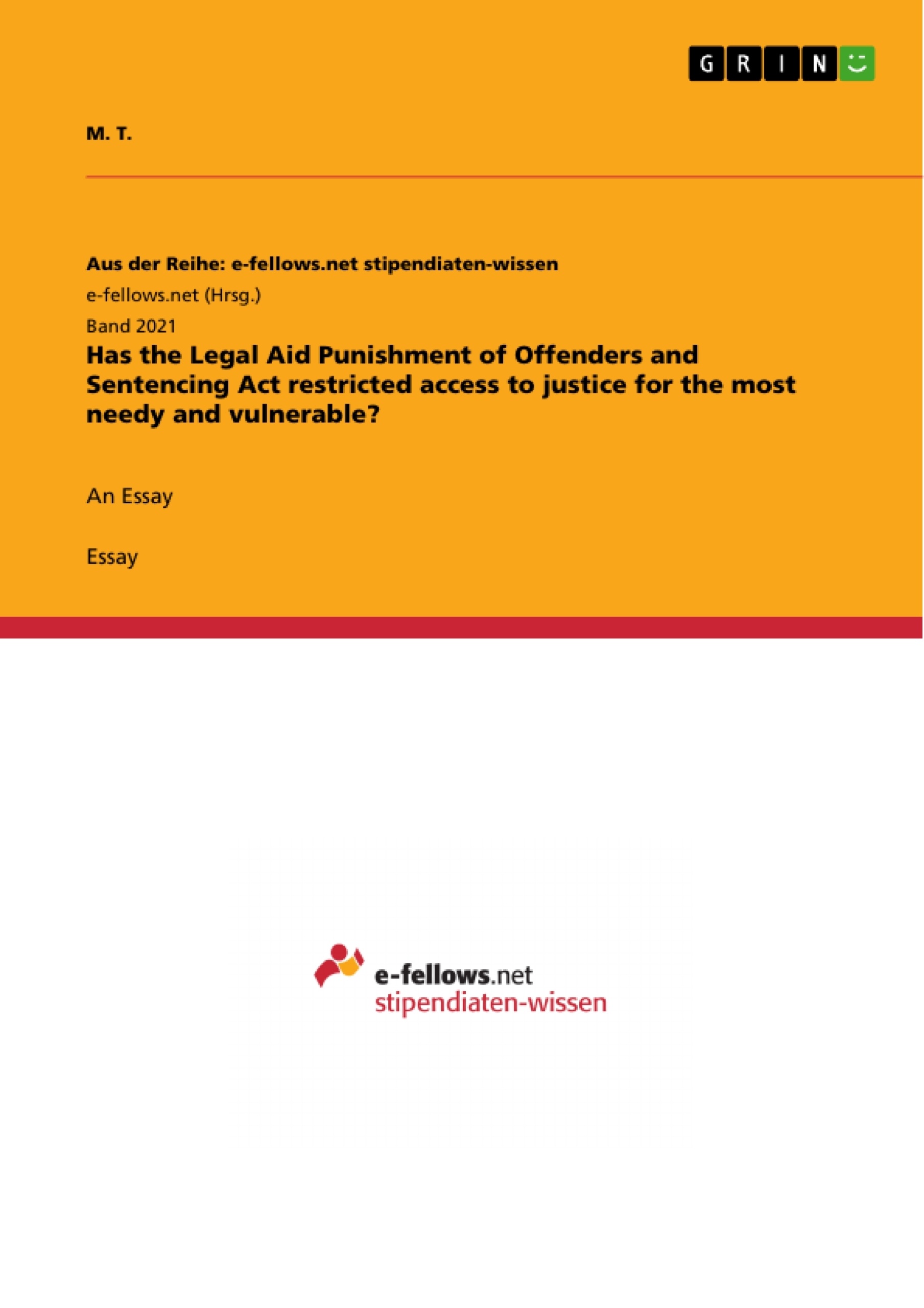The aim of this essay is to work out the legal aid changes brought about by the LASPO and to discuss if they restricted access to justice for the most needy and vulnerable. First, this essay will explain the term ‘legal aid’, then the situation and the problems before the LASPO was enforced will be outlined.
In the next section, the changes introduced by the LASPO will be illustrated, followed by an evaluation of the question of whether these changes have restricted access to justice for the most needy, concluding that they have not been denied access to justice in the cases that most merit it. Finally, the issue of whether or not access to legal advice and representation should be freely available to everyone will be discussed, reaching the conclusion that not everyone should be freely entitled to legal aid.
Inhaltsverzeichnis (Table of Contents)
- I. Introduction
- II. Main Part
- 1. Legal Aid
- 2. LASPO
- 3. Legal Aid Changes
- 4. Evaluation
- III. Final Thoughts
Zielsetzung und Themenschwerpunkte (Objectives and Key Themes)
This essay examines the legal aid changes brought about by the Legal Aid, Sentencing and Punishment of Offenders Act 2012 (LASPO) and assesses their impact on access to justice for the most needy and vulnerable. The essay begins by defining legal aid and outlining the situation and challenges before the LASPO was implemented. It then details the changes introduced by the LASPO, followed by an evaluation of whether these changes have restricted access to justice for the most vulnerable.
- The impact of LASPO on access to justice for the most vulnerable
- The role of legal aid in ensuring equal access to justice
- The definition of "most needy and vulnerable" in the context of legal aid
- The effectiveness of legal aid in providing justice for the most vulnerable
- The balance between cost-effectiveness and access to justice in legal aid reform
Zusammenfassung der Kapitel (Chapter Summaries)
- I. Introduction: This chapter introduces the topic of legal aid, highlighting the issue of access to justice for those unable to afford legal representation. It outlines the essay's aim to analyze the impact of the LASPO on access to justice and presents the structure of the essay.
- II. Main Part:
- 1. Legal Aid: This section defines legal aid and its importance in ensuring equal access to justice for all. It discusses the historical background of legal aid in England and Wales and its role in upholding the right to a fair trial as enshrined in the European Convention on Human Rights.
- 2. LASPO: This section discusses the reasons behind the LASPO reform, including criticisms of the existing legal aid scheme and the need for cost control. It highlights the significance of the LASPO in introducing substantial changes to the scope and provision of legal aid.
- 3. Legal Aid Changes: This section details the specific changes implemented by the LASPO, including the reduction in the scope of matters covered by legal aid and the introduction of new eligibility criteria. It also discusses the impact of these changes on the availability of legal aid in various areas, such as family law, debt cases, and employment law.
- 4. Evaluation: This section evaluates the impact of the LASPO on access to justice for the most vulnerable. It presents arguments both for and against the claim that the LASPO has restricted access to justice, citing examples of cases where individuals have been denied legal aid despite being in dire need.
Schlüsselwörter (Keywords)
This essay focuses on the key concepts of legal aid, access to justice, the LASPO reform, and its impact on the most vulnerable individuals. The core themes include the importance of equal access to justice, the challenges of balancing cost-effectiveness with accessibility, and the potential consequences of restricted legal aid on the ability of those in need to effectively defend their rights.
Frequently Asked Questions
What is the LASPO Act 2012?
The Legal Aid, Sentencing and Punishment of Offenders Act 2012 is a piece of legislation that introduced significant reforms to the legal aid system in England and Wales, primarily to control costs.
Has LASPO restricted access to justice for the vulnerable?
The essay evaluates this claim and concludes that while the scope of legal aid was reduced, access to justice has not been denied in cases that most merit it.
Which areas of law were most affected by the LASPO changes?
The reform significantly impacted family law, debt cases, and employment law by reducing the types of matters eligible for public funding.
Should legal aid be free for everyone?
The essay discusses this issue and reaches the conclusion that not everyone should be freely entitled to legal aid, emphasizing the need for eligibility criteria.
What is the historical role of legal aid in the UK?
Legal aid was established to ensure equal access to justice and to uphold the right to a fair trial as guaranteed by the European Convention on Human Rights.
- Quote paper
- M. T. (Author), 2016, Has the Legal Aid Punishment of Offenders and Sentencing Act restricted access to justice for the most needy and vulnerable?, Munich, GRIN Verlag, https://www.grin.com/document/337065



